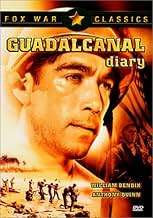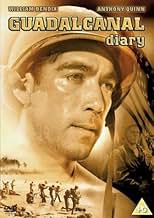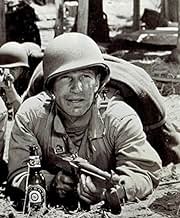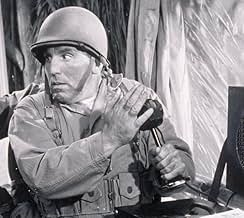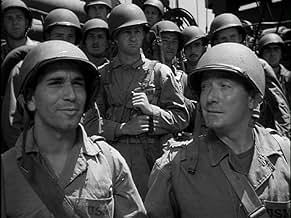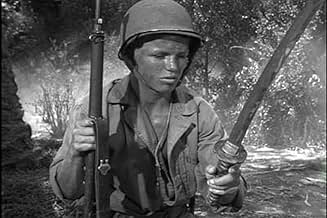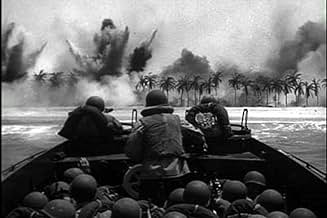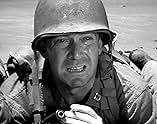IMDb RATING
6.6/10
2.4K
YOUR RATING
The story of a large U.S. Marines invasion task force bound for Guadalcanal in the Solomon Islands in 1942.The story of a large U.S. Marines invasion task force bound for Guadalcanal in the Solomon Islands in 1942.The story of a large U.S. Marines invasion task force bound for Guadalcanal in the Solomon Islands in 1942.
- Awards
- 1 win total
Eddie Acuff
- Pvt. Tex Mcllvoy
- (uncredited)
Warren Ashe
- Col. Morton
- (uncredited)
Martin Black
- Marine
- (uncredited)
Marion Carl
- Marine Pilot
- (uncredited)
Harry Carter
- Dispatch Officer
- (uncredited)
Tom Dawson
- Captain
- (uncredited)
Featured reviews
The island this film is named after is not big as islands go. Ninety miles long by roughly, twenty-odd miles wide, it lay roughly, north west by south east. The high point of Guadalcanal rose up to about 8000 feet; covered with low cloud and forest.
This film then, based on the book of the same name, and written by the war correspondent, Richard Tregaskis is, in my opinion, a better movie than, "The Sands of Iwo Jima", when it comes to paying tribute to the war record of the U.S. Marine Corps in World War Two.
I liked the opening scenes aboard the troop transport. A pleasant, and lazy Sunday morning. A religious service and hymn singing held on deck. Navy Chaplain, Father Donnelly (Preston Foster), presiding. Lloyd Nolan, as Sergeant Malone, an often under-rated actor in my opinion, wisecracking with 'Taxi' Potts, a Dodgers fanatic played by the always-likable. William Bendix. There is Richard Conte as Captain Davis. Anthony Quinn, forever a Latin-type character, Private Alvarez. Schoolboy-faced Richard Jeackel in his first-ever role, after being hoisted up from the studio mail room at Twentieth Fox. Minor Watson as Colonel Grayson, was always a reliable father-like figure who, when he landed on the beach, said this operation was unlikely to be any picnic. How right he would turn out to be. What added a shine to this film from the opening scenes was Reed Hadley narrating the story of the campaign as it unfolded, as if it was Richard Tregaskis himself. Hadley's narration seems to make the atmosphere of the film gel perfectly. A king of semi-documentary realism, if you will.
The first prisoners to be brought in are trembling, half starved in appearance, and in fear of their lives. 'Are these the monkeys were fighting?' asks Lionel Stander, as Sergeant Butch. This is the first impression they get of what passes to the marines as Japanese soldiers. It will turn out to be a false impression, soon enough. As they push further inland, the realisation soon grows that occupying this far from small, God-forsaken island is going to be no pushover. Colonel Grayson's 'no picnic' turns out to be an ugly truism.
With the Matanikau expedition a tragic failure, after landing from the sea, the realisation they're up against a determined and ferocious enemy, sinks deeper. Private Alvarez is the sole survivor from Matinikau, making it back to his own lines. Shaking with a combination of shock and vengeful anger, he recalls the other marines being picked off and bayoneted as he heads back and dives into the surf to escape.
With the second assault on Matinikau, the marine's blood is up, and they're out for blood. The Jap is taken on at his own game. The gloves are off and the chips down. They fight ruthlessness and cunning with same. And overwhelm a fanatical enemy.
In the closing scenes, the marines are relieved by fresh but yet-to-be-tried army infantrymen straight off a troop transport. One of the GI's calls out to the blooded veterans, 'What's it like?' A tired-looking Sergeant Malone answers, 'Pretty rugged, son'. For Malone, like the rest of the marines who entered the jaws of conflict and survived, they look older, and wiser. And were not found wanting. There it is then, a film that grandly commemorates the old, young men of a single platoon of the 1st Marine Division. Names on a map unknown, now entered into the history books, and the Marine Corps Hall of Fame. Matanikau, Lunga Point, Tenaru River, Bloody Ridge, Point Cruz. All fought over for a airstrip; named after Lofton Henderson, a distinguished marine pilot from the Battle of Midway.
Guadalcanal is not a name, but an emotion. So said Professor Samual Elliot Morison, the U.S. Naval Historian. How true. The Japanese were not the only enemy. There was dengue fever, malarial swamp, and humidity to sap the energy, all wrapped around with a foul-smelling jungle. There was a epitaph found at the Marine Cemetery at Lunga Point. It would have been appropriate to have displayed it along with the end credits of this film. It goes:-
That when he goes to heaven./ To Saint Peter he will tell./ Another marine reporting Sir./ I have served my time in hell.
How truthfull that piece of poetry turned out to be.
This film then, based on the book of the same name, and written by the war correspondent, Richard Tregaskis is, in my opinion, a better movie than, "The Sands of Iwo Jima", when it comes to paying tribute to the war record of the U.S. Marine Corps in World War Two.
I liked the opening scenes aboard the troop transport. A pleasant, and lazy Sunday morning. A religious service and hymn singing held on deck. Navy Chaplain, Father Donnelly (Preston Foster), presiding. Lloyd Nolan, as Sergeant Malone, an often under-rated actor in my opinion, wisecracking with 'Taxi' Potts, a Dodgers fanatic played by the always-likable. William Bendix. There is Richard Conte as Captain Davis. Anthony Quinn, forever a Latin-type character, Private Alvarez. Schoolboy-faced Richard Jeackel in his first-ever role, after being hoisted up from the studio mail room at Twentieth Fox. Minor Watson as Colonel Grayson, was always a reliable father-like figure who, when he landed on the beach, said this operation was unlikely to be any picnic. How right he would turn out to be. What added a shine to this film from the opening scenes was Reed Hadley narrating the story of the campaign as it unfolded, as if it was Richard Tregaskis himself. Hadley's narration seems to make the atmosphere of the film gel perfectly. A king of semi-documentary realism, if you will.
The first prisoners to be brought in are trembling, half starved in appearance, and in fear of their lives. 'Are these the monkeys were fighting?' asks Lionel Stander, as Sergeant Butch. This is the first impression they get of what passes to the marines as Japanese soldiers. It will turn out to be a false impression, soon enough. As they push further inland, the realisation soon grows that occupying this far from small, God-forsaken island is going to be no pushover. Colonel Grayson's 'no picnic' turns out to be an ugly truism.
With the Matanikau expedition a tragic failure, after landing from the sea, the realisation they're up against a determined and ferocious enemy, sinks deeper. Private Alvarez is the sole survivor from Matinikau, making it back to his own lines. Shaking with a combination of shock and vengeful anger, he recalls the other marines being picked off and bayoneted as he heads back and dives into the surf to escape.
With the second assault on Matinikau, the marine's blood is up, and they're out for blood. The Jap is taken on at his own game. The gloves are off and the chips down. They fight ruthlessness and cunning with same. And overwhelm a fanatical enemy.
In the closing scenes, the marines are relieved by fresh but yet-to-be-tried army infantrymen straight off a troop transport. One of the GI's calls out to the blooded veterans, 'What's it like?' A tired-looking Sergeant Malone answers, 'Pretty rugged, son'. For Malone, like the rest of the marines who entered the jaws of conflict and survived, they look older, and wiser. And were not found wanting. There it is then, a film that grandly commemorates the old, young men of a single platoon of the 1st Marine Division. Names on a map unknown, now entered into the history books, and the Marine Corps Hall of Fame. Matanikau, Lunga Point, Tenaru River, Bloody Ridge, Point Cruz. All fought over for a airstrip; named after Lofton Henderson, a distinguished marine pilot from the Battle of Midway.
Guadalcanal is not a name, but an emotion. So said Professor Samual Elliot Morison, the U.S. Naval Historian. How true. The Japanese were not the only enemy. There was dengue fever, malarial swamp, and humidity to sap the energy, all wrapped around with a foul-smelling jungle. There was a epitaph found at the Marine Cemetery at Lunga Point. It would have been appropriate to have displayed it along with the end credits of this film. It goes:-
That when he goes to heaven./ To Saint Peter he will tell./ Another marine reporting Sir./ I have served my time in hell.
How truthfull that piece of poetry turned out to be.
I grew up watching World War 2 movies with my Father (WW 2 US Army Combat engineer), so I can say that I know a lot about the genre. This movie is one of the better ones. I rate it a 7 on a 10 point scale. Some people think that the "gee-wheez" dialog is not real of what the soldiers would say. They are right, however we must keep in mind that this movie was made in the 40's for people living in the 1940's and not the 2000's. In the 1940's swearing and tough real talk was just as common as it is today, but there was no need for them fill a movie up with such talk. The movies were made to stand on it's story merit and not be just a swear fest based "roller coaster ride" we have today. Taken in context, the movie hits home a very common point for movie made during the war. The point is that our boys who are like all of us in America (1940's view on the world) have it rough, they need our support, but they will win. Note movies made after the war have a different viewpoint.
This is one of the better (and most topical) of Hollywood’s wartime efforts, but which seems to have been largely overlooked among the surplus of such films – possibly because it was helmed by journeyman director Seiler.
Still, the handling is entirely professional and the film makes the most of a good script by Lamar Trotti – peopled with believable characters ably portrayed by a fine cast (Preston Foster, Lloyd Nolan, Richard Conte, Anthony Quinn, Richard Jaeckel). The requisite comic relief provided by William Bendix and Lionel Stander is slightly overstated…but, then, Bendix delivers the film’s most moving speech towards the end.
The film – unavoidably jingoistic but, at the same time, realistic i.e. thankfully free of gung-ho heroics – balances taut action sequences (culminating in the so-called “Great Offensive”) with a handful of undeniably powerful, lingering images (particularly the line-up of dead U.S. marines ambushed on a beach by the devious Japanese forces). I’ll be following this with Cornel Wilde’s well-regarded BEACH RED (1967), which also deals with WWII combat in the Pacific; besides, I also own – but have yet to watch – the R2 DVD of Lewis Milestone’s contemporaneous THE PURPLE HEART (1944), which tackles similar events from a unique perspective.
Still, the handling is entirely professional and the film makes the most of a good script by Lamar Trotti – peopled with believable characters ably portrayed by a fine cast (Preston Foster, Lloyd Nolan, Richard Conte, Anthony Quinn, Richard Jaeckel). The requisite comic relief provided by William Bendix and Lionel Stander is slightly overstated…but, then, Bendix delivers the film’s most moving speech towards the end.
The film – unavoidably jingoistic but, at the same time, realistic i.e. thankfully free of gung-ho heroics – balances taut action sequences (culminating in the so-called “Great Offensive”) with a handful of undeniably powerful, lingering images (particularly the line-up of dead U.S. marines ambushed on a beach by the devious Japanese forces). I’ll be following this with Cornel Wilde’s well-regarded BEACH RED (1967), which also deals with WWII combat in the Pacific; besides, I also own – but have yet to watch – the R2 DVD of Lewis Milestone’s contemporaneous THE PURPLE HEART (1944), which tackles similar events from a unique perspective.
I can't be offended by the truth, and the truth is, GIs called the enemy in the South Pacific "Japs," "Slant-eyes," and a lot worse. If that offends anyone, then why watch a film that you know is about a bloody WWII battle, where passions were running high? After the Marine shoots the Japanese sniper out of the tree, would it have been less offensive if he would have said, "Well, I just dispatched another one of the Asian enemy." Really! I can just imagine what someone would say in the heat of battle. It'd be a hell of a lot more descriptive than "Slant-eye."
As for the nameless reviewer who criticized the scene wherein the GI did not get mail, I can tell you first hand, that there were fewer sights more pathetic than the guys standing there after mailcall without a single letter in their hand. It was hard to watch. We all felt for those guys. You knew what they were going through, yet you couldn't do a damn thing to help them. I know how I felt when days went by without a letter from home--from ANYONE. Being in combat in a foreign land must have made it exponentially worse. I would bet that the reviewer who made that criticism never spent one day in his country's service.
As for the nameless reviewer who criticized the scene wherein the GI did not get mail, I can tell you first hand, that there were fewer sights more pathetic than the guys standing there after mailcall without a single letter in their hand. It was hard to watch. We all felt for those guys. You knew what they were going through, yet you couldn't do a damn thing to help them. I know how I felt when days went by without a letter from home--from ANYONE. Being in combat in a foreign land must have made it exponentially worse. I would bet that the reviewer who made that criticism never spent one day in his country's service.
Considering that this was a WWII movie released in 1943,while the war was still going and a ways from being resolved,this movie was probably as effective and convincing as you were going to get for the period. Certainly,given the state of the nation's need to keep the national morale up for the war effort,anything too graphic or too gritty would(besides probably raise the dander of the censorship standards of the day)probably would've deflated the efforts to get stateside citizenry to buying war bonds,cutting usage of certain products(metals come first to mind)and probably would've helped undercut the Roosevelt administrations efforts to keep the war push at the rate it was going. If it's too soft,it becomes mostly jingoistic and loses just about all of the entertainment value it could possibly have. Fortunately(perhaps by design,maybe not),the makers of this movie were able to strike the right--if perhaps unremarkable--balance.
Being a grandchild of the generations being showcased here(erstwhile known by some as "The Greatest Generation"),I have only stories told or written about the two theaters of war effort,not to mention the movies. Of course,as more years would pass between the conclusion of that war,the movies that would be made(many of them sprung from books)would become grittier,harsher,a little less glossy or idealistic,and ultimately,more graphically violent. THerefore,I(And I'm guessing many of my generation)could view this movie somewhat jadedly: the dialog is so simple and full of gaps that it almost feels like it could be parodied on Mystery Science Theatre 3000,add in the fact that many of the "kills" and soldiers dropping dead are noticeably staged and forced looking and you have a film that might have a hard time being instantly compelling to people who've seen things ranging from The Great EScape to Saving Private Ryan. Still,there ARE saving graces to this movie that make it stand the test of time:
--The earnest and no-nonsense portrayal of battle and the basic emotions between MArines,from deployment aboard a battleship carrier,right on through the two month battle to claim and seal off the island,is honest enough that anyone who's been through battle,known someone who has been(or still is)at war can feel some common relationship with the characters in the film. Some poignant lines are spoken by the perceived comic relief of the film(a brash,slightly dense private from Brooklyn played by luggish William Bendix)and the wise yet quietly strong chaplain(Preston Brooks),among others,to give this film some heft and
--The battle scenes are concise and tight,showcasing plenty of gunfire,explosions,bombings and other various forms of combat violence WITHOUT being tedious or trivial. They are not neat,pretty or always with the desirable outcomes,but they are neither futile nor random.
MOst of the characters here seem like composites,no doubt probably an amalgam of (Mostly)young MArines and Army men that script co-writer(with Lamar Trotti) and book source writer Richard Tregaskis met while covering the Pacific Theatre of Operations in the war. I imagine there was pressure on the studio and director Lewis Seiler to crank out this film as fast as possible to stoke the fires of stateside interest in the war effort,so if the finished product doesn't exactly shine,I think he and the people making this movie can be forgiven. All in all,this is a film to recommend for those who are curious about movies set around WWII,particularly films about it that are IN the moment,when America was only able to have so much perspective on it.
Being a grandchild of the generations being showcased here(erstwhile known by some as "The Greatest Generation"),I have only stories told or written about the two theaters of war effort,not to mention the movies. Of course,as more years would pass between the conclusion of that war,the movies that would be made(many of them sprung from books)would become grittier,harsher,a little less glossy or idealistic,and ultimately,more graphically violent. THerefore,I(And I'm guessing many of my generation)could view this movie somewhat jadedly: the dialog is so simple and full of gaps that it almost feels like it could be parodied on Mystery Science Theatre 3000,add in the fact that many of the "kills" and soldiers dropping dead are noticeably staged and forced looking and you have a film that might have a hard time being instantly compelling to people who've seen things ranging from The Great EScape to Saving Private Ryan. Still,there ARE saving graces to this movie that make it stand the test of time:
--The earnest and no-nonsense portrayal of battle and the basic emotions between MArines,from deployment aboard a battleship carrier,right on through the two month battle to claim and seal off the island,is honest enough that anyone who's been through battle,known someone who has been(or still is)at war can feel some common relationship with the characters in the film. Some poignant lines are spoken by the perceived comic relief of the film(a brash,slightly dense private from Brooklyn played by luggish William Bendix)and the wise yet quietly strong chaplain(Preston Brooks),among others,to give this film some heft and
--The battle scenes are concise and tight,showcasing plenty of gunfire,explosions,bombings and other various forms of combat violence WITHOUT being tedious or trivial. They are not neat,pretty or always with the desirable outcomes,but they are neither futile nor random.
MOst of the characters here seem like composites,no doubt probably an amalgam of (Mostly)young MArines and Army men that script co-writer(with Lamar Trotti) and book source writer Richard Tregaskis met while covering the Pacific Theatre of Operations in the war. I imagine there was pressure on the studio and director Lewis Seiler to crank out this film as fast as possible to stoke the fires of stateside interest in the war effort,so if the finished product doesn't exactly shine,I think he and the people making this movie can be forgiven. All in all,this is a film to recommend for those who are curious about movies set around WWII,particularly films about it that are IN the moment,when America was only able to have so much perspective on it.
Did you know
- TriviaMarine Corps Capt. Marion Carl, a multi-ace (18.5 air victories), makes an appearance as a Marine Corps pilot. Capt. Carl wears his baseball cap with the bill pointed skyward and makes the comment, "Don't look now, fellas, but a truck of gas just came on the field." Capt. Carl was a survivor of the Battle of Midway and the air campaign for Guadalcanal in 1942. He was awarded 2 Navy Crosses for his actions at Midway and Guadalcanal. Sadly, on June 28, 1998, he was murdered in his Oregon home by a home intruder.
- GoofsWhen Japanese snipers hid in the tops of trees, they tied themselves into their positions. They did not fall out of the trees when shot.
- Quotes
Cpl. Aloysius T. 'Taxi' Potts: [In dugout waiting out a heavy artillery barrage] I don't mind the one with my name on it. It's the one that says, 'To whom it may concern' that I don't like.
[after the barrage increases]
Cpl. Aloysius T. 'Taxi' Potts: They're throwing everything at us but the kitchen stove.
Gunnery Sgt. Hook Malone: [after an even louder explosion] That's the stove now!
- Crazy creditsThe film's opening prologue in the preface of a book states: A new chapter in the history of America by a correspondent who landed on Guadalcanal with the first detachment of United States Marines.
- ConnectionsEdited into Tarawa, tête de pont (1958)
- SoundtracksMarine Hymn
(uncredited)
Music by Jacques Offenbach from "Geneviève de Brabant"
Played during the opening credits and occasionally in the score
- How long is Guadalcanal Diary?Powered by Alexa
Details
- Runtime1 hour 33 minutes
- Color
- Aspect ratio
- 1.37 : 1
Contribute to this page
Suggest an edit or add missing content



